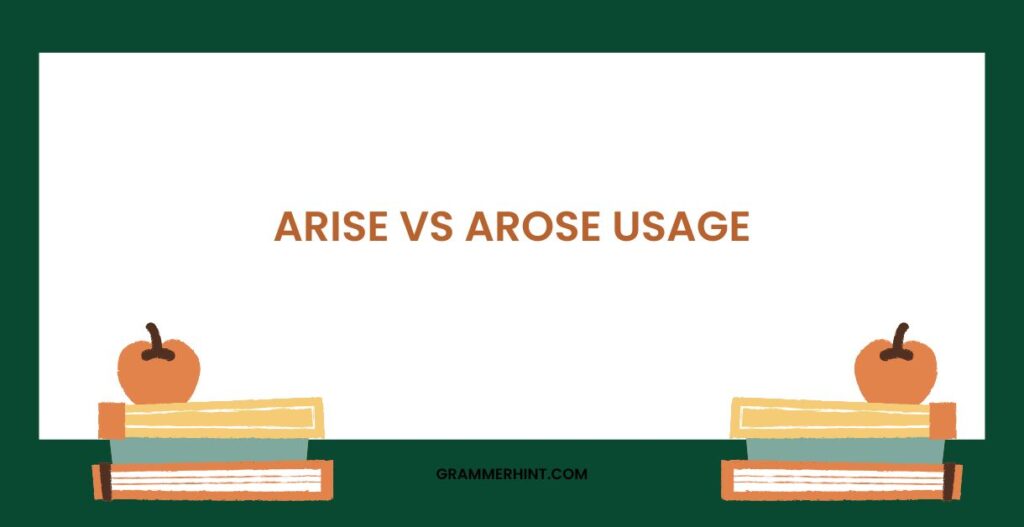You’ve probably read or even written the word “arised” and paused “Wait, is that even a word?” You’re not alone. The confusion around the past tense of arise is one of those common grammar mistakes that sneak into even professional writing.
It sounds right, but it isn’t. In this guide, we’ll break down the verb conjugation of Arise, explore why arised is incorrect, and explain the difference between arise and risewith real-life examples like emails and memos.
What Does “Arise” Mean?
Definition and Usage in Modern English
The verb Arise means to come into being, to get up, or to emerge. It’s often used in formal writing, literature, and discussions about situations or conditions.
✅ Correct usage:
- Problems may arise if deadlines are not met.
- New opportunities arise when the market shifts.
“Arise” in Present Tense
- I arise early every morning.
- Issues arise when communication breaks down.
The Big Question: Arised or Arose?
Why “Arised” Is Incorrect
Let’s get this straight: “Arised” is not a valid English word. It’s a mistaken usage of the verb arise. According to all grammar rules for irregular verbs, arise doesn’t follow the regular -ed pattern.
- ❌ He arised late to the meeting.
- ✅ He arose late to the meeting.
Why “arised” is wrong: Because arise is an irregular verb, it does not take the standard -ed suffix to form its past tense.
Correct Past Tense of Arise: Arose
Conjugation of Arise
Let’s take a look at the full arise conjugation chart:
| Tense | Form |
|---|---|
| Base form | arise |
| Past tense | arose |
| Past participle | arisen |
So, the past tense of arise is arose, and the past participle of arise is arisen.
Examples in Context: Arise vs Arose Usage

Email Scenario – Present Tense
Subject: Issue with the New Billing System
Hi Sarah,
Just a heads-up some concerns may arise if we implement the new billing format this week. Let’s schedule a call to review first.Best,
Jenna
Email Scenario – Past Tense
Subject: Feedback from Last Week’s Meeting
Hi Mark,
Several concerns arose during the project debrief. The team flagged gaps in workflow communication that we’ll need to address.Thanks,
Claire
Why Is “Arise” Irregular? A Dive into History and Etymology
Etymology and Language Evolution
The irregularity of arise comes from its linguistic roots.
- Old English: arīsan – “to rise, get up”
- Middle English: arisen – used similarly, still irregular
- Old Saxon & Gothic: related forms also avoided regular endings
The verb has carried its irregular verb status for centuries, resisting the shift toward the -ed endings typical in regular verbs.
This historic resistance is part of a broader pattern across English irregular verbs, many of which are holdovers from Germanic roots.
Arise vs Rise: Don’t Get Them Mixed Up
These two are siblings, but not twins.
| Verb | Meaning | Past Tense | Past Participle |
|---|---|---|---|
| Arise | To come into being; emerge | Arose | Arisen |
| Rise | To move upward or get up physically | Rose | Risen |
- A problem arose during the call.
- He rose from the chair slowly.
Arise vs Rise Usage Tip
Think of arise as more abstract—conditions, events, ideas. Rise is usually physical or visual.
Why Learners (and Even Natives) Say “Arised”
It’s easy to assume “arise” works like “arrive” → “arrived”. This follows regular verb rules. But not all verbs play fair.
Here’s the trap:
- Speak → spoke → spoken ✅
- Dive → dived OR dove ✅ (depending on region)
- Arise → arised ❌ (Incorrect)
- Arise → arose ✅ (Correct)
It’s part of a larger category of confusing English verbs that don’t fit standard verb conjugation rules.
How to Remember: Arise Arose Arisen
Here’s a simple mnemonic:
“Arise in the present,
Arose in the past,
And it has arisen at last.”
Post this above your desk or teach it in your next ESL lesson!
Correct vs Incorrect Usage Table
| Sentence | Correct? |
|---|---|
| She arised during the national anthem. | ❌ No |
| She arose during the national anthem. | ✅ Yes |
| An issue has arised with your account. | ❌ No |
| An issue has arisen with your account. | ✅ Yes |
How to Use Arise in a Sentence (With Examples)
Present Tense
- New conflicts arise when boundaries aren’t respected.
- Emotional challenges often arise in long-distance relationships.
Past Tense
- Several conflicts arose during the negotiation process.
- A unique opportunity arose for international expansion.
Past Participle
- Issues have arisen due to incomplete data.
- Solutions had already arisen by the time the meeting started.
Similar Verbs and Their Tenses
Here are other irregular verb examples that follow unusual patterns:
| Base | Past | Past Participle |
|---|---|---|
| Go | Went | Gone |
| Come | Came | Come |
| Rise | Rose | Risen |
| Take | Took | Taken |
| Begin | Began | Begun |
| Arise | Arose | Arisen |
These don’t follow the -ed rule, so they’re part of the English irregular verbs list.
#EnglishGrammar Tips for Mastery
Here’s how to avoid common verb mistakes like using “arised”:
- Learn verbs in all three forms: base, past, and participle.
- Use a verb tense table for reference.
- Review lists of intransitive verbs, like arise, which don’t take direct objects.
- Practice writing sentence examples (present vs past).
- Read English literature or news articles—correct usage will stick naturally.
Pronunciation Guide: Arise, Arose, Arisen
- Arise /əˈraɪz/
- Arose /əˈroʊz/
- Arisen /əˈrɪzən/
Notice the shift in vowel sounds. Practicing pronunciation improves both fluency and comprehension.
Common Mistakes and Why They Happen
- Misunderstanding verb forms.
- Over-regularization: applying regular vs irregular rules incorrectly.
- Confusion from sound-alike verbs like arise and raise.
- Lack of exposure to correct verb usage in writing or speech.
This is why “arised or arose” remains a Google search trend and a key point in any lesson on English grammar past tense.
Conclusion: So, Is Arised Correct?
Let’s wrap it up.
- “Arised” is not correct. ❌
- The past tense of arise is “arose.” ✅
- The past participle is “arisen.”
- It’s an irregular, intransitive verb rooted in Old English, Middle English, and Gothic roots.
Understanding this isn’t just about avoiding a grammar slip. It’s about using language confidently and clearly whether you’re writing emails, reports, or casual messages.









